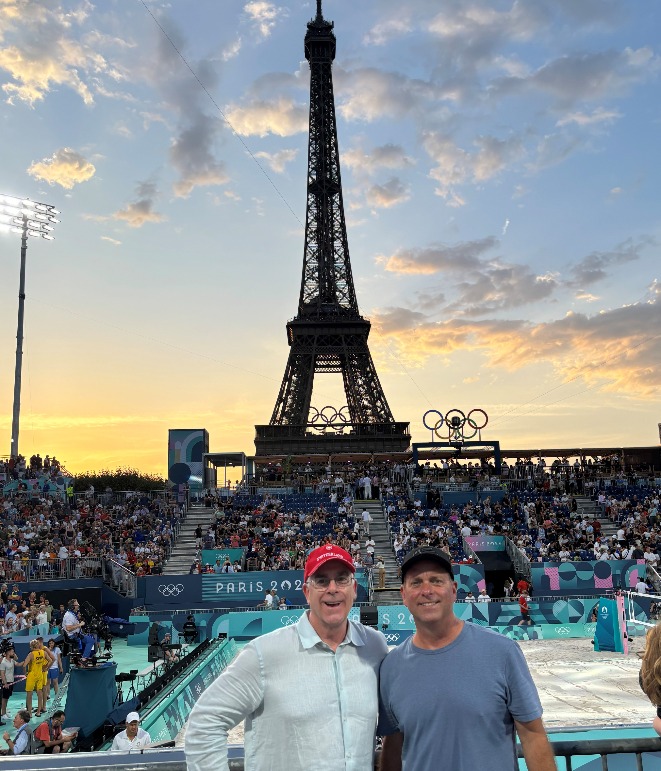
How to Talk with Your Hands
New research led by USC Marshall’s Luca Cascio Rizzo reveals that gestures that visually represent what speakers say help audiences perceive them as more competent and persuasive.
25 by 75: Marshall Professor and USC Alum Tackle Sports Bucket List
25 by 75: Marshall Professor and USC Alum Tackle Sports Bucket List
Professor David Carter and USC alum George Ross ’87 are hitting the 25 most iconic sports events in the world, including the 2024 Paris Olympic Games.

David Carter and George Ross enjoying beach volleyball at the 2024 Paris Olympic Games.
[Photo courtesy of Carter]
David Carter ’86, MBA ’91 and George Ross ’87 stood on the streets of Pamplona, Spain, in white t-shirts, bright red bandanas tied around their necks. They had a plan: run fast and make it to the bullpen. The ground started to shake. They heard shrieks from down the road. As a 2000-pound bull raced around the corner, the plan evaporated.
It wasn’t an accident that Carter, an adjunct professor of management and organization, and Ross ended up at the famous Running of the Bulls in Spain in 2016. It was all a part of a plan, devised by the pair earlier that same year, to attend the 25 most iconic sporting events in the world before they turned 75, including the 2024 Paris Olympics. The dangerous Spanish run was the first stop on a list that they’re working on to this day.
An author of four books about the business of sports, Carter is an expert in the industry. In 1999, he founded The Sports Business Group, a consulting firm dedicated to sports marketing. He’s taught at USC since 1994, specializing in classes like The Business of Sport (MOR579), Strategic Planning for the Sports Industry, and Principles of Sports Management.
In 2016, he and his longtime friend from junior high George Ross, a sports fan, Trojan alum, and Las Vegas real estate developer, came up with the parameters for their ambitious bucket list: Each event must be iconic; they could only see one event per sport; each country could only be visited once; and they would complete the more grueling events early on (before they got too old to run with the bulls).
The pair pitched ideas and soon dwindled a list of 50 possibilities down to 25. The events would be a celebration of decades-long friendship, as well as a marriage of their unique approaches to sports.
While Ross was thrilled with the pageantry and the competition itself, the adjunct professor viewed the events through a more pedagogical lens — a lesson in sports marketing, planning, and culture that he could share with his classes. Each year, when Carter returns to campus following one of these events, he infuses the lessons he's learned at events into his class dicussions.
At the World Cup Final in Moscow, he noted the use of “sportswashing” to cover up Russian human rights concerns and controversies. At the Masters and Wimbledon, the exemplary branding and the first-class marketing struck Carter — not just on the top level but down to the most minute details, like upkeep of the course or the welcoming manner of the volunteers.
In business, you have a plan until you don’t, and then you have a crisis. When you hear the bulls running, you can have every plan in the world. You want to make it to the end of the route and make it into the bullpen, but then it turns into an immediate crisis as you hear them and you see people getting trampled. What is your backup plan?
— David Carter
Adjunct Professor of Management and Organization
In Pamplona, Carter used the panic of the day to illustrate a clear takeaway about business.
“In business, you have a plan until you don’t, and then you have a crisis,” Carter said. “When you hear the bulls running, you can have every plan in the world. You want to make it to the end of the route and make it into the bullpen, but then it turns into an immediate crisis as you hear them and you see people getting trampled. What is your backup plan?”
Carter incorporates real-world examples into his classes as well, emphasizing how course material can be applied to a major tournament or match. He also urges students to share their own thoughts on the events.
“I have a single perspective, and the students might have a different perspective,” Carter said. “They’re a different target market. Their view of sports and how they consume sports content is very different.”
Over the years, Carter and Ross have traveled to Alaska for the Iditarod Trail Dog Race, more commonly referred to as The Iditarod, gone sportfishing in Panama, and checked off the Kentucky Derby, Masters, Wimbledon, and even the Iron Bowl between Alabama and Auburn. Now, they’re at the Paris Olympic Games, enjoying the spectacle of the opening ceremonies and the sheer variety of sports.
No matter where they are, people ask about the list. For Carter, however, the trips are about so much more than that.
“It’s a big part of being best friends, but it's not the only thing. We have career challenges and issues and we have family developments,” Carter explained. “But it seems like no matter where we go individually or especially together, people are asking about the bucket list.”
Carter and Ross head to Japan next spring to see sumo wrestling in Osaka before taking the train to Tokyo to watch Japanese superstar Shohei Ohtani and the Los Angeles Dodgers open the MLB season at the Tokyo Dome against the Chicago Cubs.
By then, Carter and Ross will be just over halfway finished with the list. Only they know where they’ll go next.
RELATED
How to Talk with Your Hands
New research led by USC Marshall’s Luca Cascio Rizzo reveals that gestures that visually represent what speakers say help audiences perceive them as more competent and persuasive.
Interview: Paul Orlando in Beta Boom
Orlando explains how he and the Greif Incubator support founders at USC Marshall.
Marshall Faculty Publications, Awards, and Honors: November 2025
We are proud to highlight the many accomplishments of Marshall’s exceptional faculty recognized for recently accepted and published research and achievements in their field.
Forbes 30 Under 30 Entrepreneur Shares His Journey from Business School to Startup Success
Bobby Pinckney ’20 is creating impact with innovative technological ventures and inspiring new Trojans to shape the future.
Interview: Marco Aponte-Moreno in KCBS
Aponte-Moreno discusses the tense situation between the United States and Venezuela and the prospect of a possible regime change in the South American country.